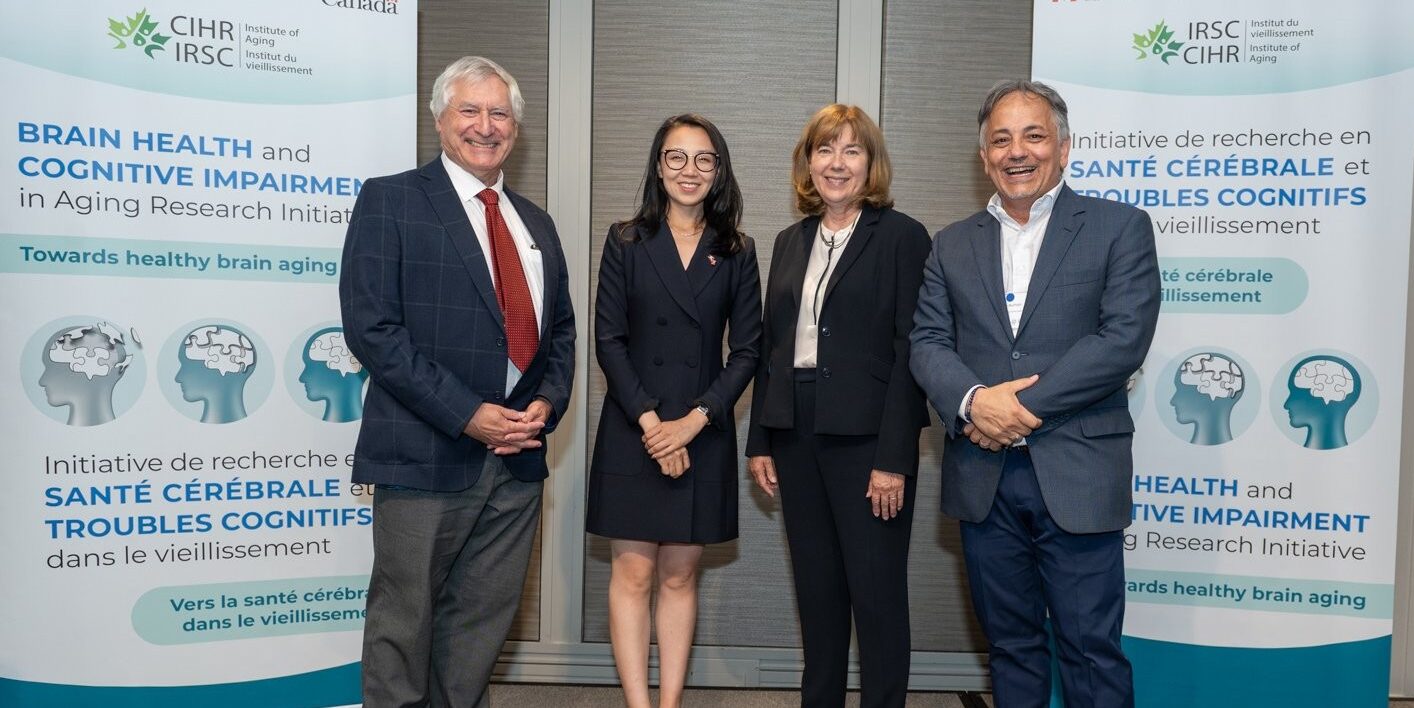
CIHR’s CCNA Phase III: Research Teams funding announcement
We are thrilled to share the results of the Canadian Institute of Health Research’s (CIHR) Canadian Consortium on Neurodegeneration in Aging (CCNA) Phase III: Research Teams funding opportunity. With researchers from across Canada, 16 new research teams will study prevention, diagnosis, treatment, and care for people with dementia and their caregivers.
This research is funded by CIHR’s Brain Health and Cognitive Impairment in Aging Research Initiative along with the following partners: the Azrieli Foundation and its Canadian Centre for Caregiving Excellence and the Brain Canada Foundation. Two international teams, co-funded by Australia’s National Health and Medical Research Council, will research dementia in Indigenous populations in Canada and Australia.
Please join us in congratulating these new research teams, listed below.
We look forward to seeing how this vital research will help shape dementia prevention, treatment, and care. To read more, please click here.
- Multinational Assessment of Risk factors and Vascular disease in Elders with dementias using Longitudinal cohort studies: The MARVEL Project
Amy Hsu – Bruyère Health Research Institute, Ontario - Wearable sensing and stimulation of sleep physiological features related to resistance and resilience to dementia-associated brain changes
Andrew Lim – University of Toronto, Ontario & Thanh Dang-Vu – Institut universitaire de gériatrie de Montréal, Québec - Advancing equity in dementia care in Canada: An intersectional and participatory approach
Claire Godard-Sebillotte – Research Institute of the McGill University Health Centre, Québec & Sathya Karunananthan – University of Ottawa, Ontario - Promoting health equity among people living with dementia and care partners in ethno-racial communities: Co-designing quality of life supports
Laura Middleton – University of Waterloo, Ontario & Carrie McAiney – University of Waterloo, Ontario - The Mobility, Exercise, and Cognition (MEC) Team: A novel approach to dementia prediction and prevention by integrating cognitive, mobility, and exercise interventions to combat neurodegeneration in aging
Manuel M Montero Odasso – Western University, Ontario & Louis Bherer – Montreal Heart Institute, Québec - Determining mechanisms of sensory-cognitive links in aging and dementia to inform interventions and public health: A multi-disciplinary team approach
Natalie Phillips – Concordia University, Québec - Innovating driving assessment in adults with cognitive impairment: A person-centered approach leveraging artificial intelligence and digital technology
Sayeh Bayat – University of Calgary, Alberta - Canadian dementia health system performance team
Susan E Bronskill – ICES, Ontario & Dallas Seitz – University of Calgary, Alberta - Developing novel brain imaging and blood testing against a major early disease driver for timely diagnosis and effective treatment of age-dependent tauopathies
Kun Ping Lu – Western University, Ontario & Xiao Zhen Zhou – Western University, Ontario - Investigating cellular biomarkers of vascular white matter injury in neurodegeneration
Amanpreet Badhwar – Université de Montréal, Québec - Co-design, implementation, and evaluation of a trauma-informed care framework to enhance trauma-informed practices in long-term care
Kim A Ritchie – Trent University, Ontario & Sophiya Benjamin – McMaster University, Ontario - Améliorer la qualité de vie des personnes âgées vivant avec une maladie neurodégénérative par l’étude de la mise à l’échelle d’outils soutenant les transitions de soins au sein des communautés francophones au Canada
Patrick Archambault – Université Laval, Québec & France Légaré – Université Laval, Québec - Effects of GLP1 agonist-induced weight loss on cerebral and blood markers of neurodegeneration in individuals with obesity and genetic risk for Alzheimer’s disease
Alain Dagher – McGill University, Québec - Perimenopause & exercise: Moving for a stronger and resilient brain by the EPIC team
Teresa Y Liu-Ambrose – University of British Columbia, British Columbia & Cindy Barha– University of Calgary, Alberta - Strengths-based approaches to assessing and measuring cognitive impairment, dementia, and frailty in older First Nations people in Canada and Australia
Jennifer Walker – McMaster University, Ontario & Dina LoGiudice – University of Melbourne, Australia - Co-design of Indigenous dementia Resources in Canada and AustraLia (CIRCLE): Enhancing health communication for Indigenous peoples along the dementia journey
Pamela Marie Roach – University of Calgary, Alberta & Kate Smith – University of Western Australia, Australia
Share
Published on July 30, 2025

Receive the
latest news
Stay updated with the latest research developments from CCNA-CCNV. Our news section provides insights into cutting-edge studies, advancements in dementia care, and key findings in brain health research.




